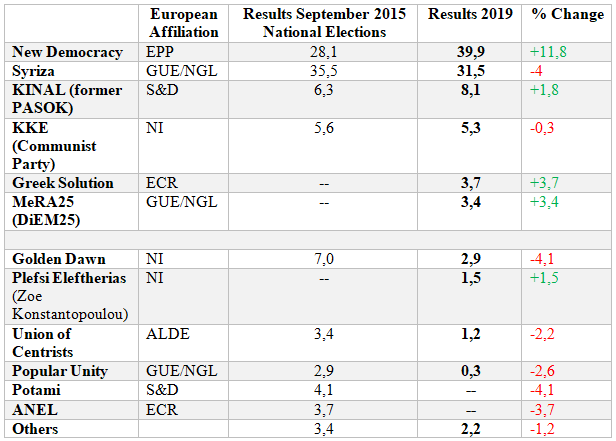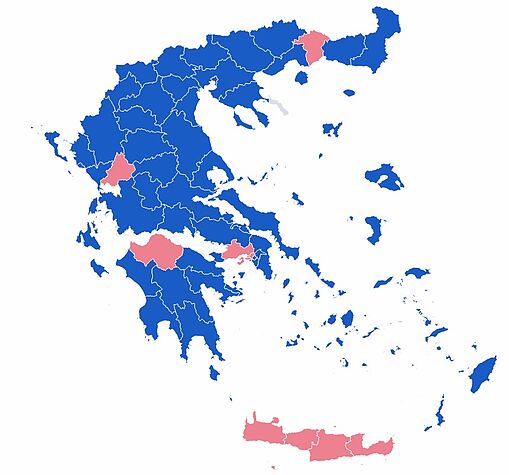By now you know how it went. I know you were glued to the TV Sunday night to hear the results. Because these Greek elections were also ours…
originally published by Il Manifesto, edition 9 July 2019 – written 8 July, updated 10 July;
New Democracy’s lead was expected, anticipated as it was by the European vote; on 26 May it led Syriza 33.12% to 23.75%. It was also expected by the people who gradually gathered around the party’s big tent on Syntagma Square, more to be able to share the bitterness of the verdict.
There wasn’t even anger anymore; that had already been used up, although everyone would have wanted to scream at the images, which, starting at 8 o’clock, after the first exit polls, began to flood the big TV screen: those of Kyriakos Mitsotakis as a kid, an adolescent, and a grown-up, together with his father Kostantino, ex-Prime Minister; of his sister Dora, ex-Foreign Minister and then Mayor of Athens; of her son Kostas who had just succeeded his mother in this role; of Mitsotakis’s own son, whose name I don’t recall, nor the public office entrusted to him.
The archives are full of the photos and videos of the winner because the Mitsotakis’s are one of Greece’s political dynasties, in government for decades in various combinations with just as many other dynasties – the Karamanlis’s, Venizelos’s, and Papandreou’s. Tsipras’s name must have sounded too anomalous to last.
And yet, as the hours went on, the evolution of the figures began to change, to finally stabilize for Syriza at about ten points above those of the European elections – almost as much as it got in the legendary elections of September 2015, then 34.4%, now 31.5%. Not enough to form a government in view of New Democracy’s blue tide, which absorbed all of the right-wing vote, including Golden Dawn’s; due to an absurd electoral law it can now be awarded a quantity of deputies (50 of 300 members of parliament) that guarantees it an absolute majority, which it otherwise would not have had.
In the meanwhile, the obstinate KKE (the Greek Communist Party) has resisted, and even gained a bit – 15 deputies – while 9 deputies have been elected from Varoufakis’s party, MeRA25, who ferociously attacked Tsipras for not having done what not even they would have known to do.

In the Square we begin to reflect – we Italians (a handful of comrades mobilised by l’Altra Europa con Tsipras – Massimo Torelli, Corradino Mineo, and others), candidates, ex-deputies and ex-ministers among the crowd. Little by little we tell each other that in reality this result is a surprising success.
Just think: only ten years ago, in the 2009 elections, Syriza got 4.6%, the kind of figure that we in the European left have unfortunately become accustomed to think of as a fantastic goal.
In January 2015 it even entered government, six months later it was confirmed and then subjected to one of the most abusive episodes of harassment on the part of the European Union which confronts it with a dramatic choice: break with Brussels, thus remaining isolated in the midst of apathy shown even by potential allies, and with the risk of exposing the country to a catastrophe – or assume the burden of freeing Greece from the dictates of the Memorandum in order to regain sovereignty.
Tsipras made the second, unpopular choice, the only reasonable one, and he avoided populisms and demagogy. And despite this, he only lost a bit of his electorate.
In a Europe in which the left and centre-left are declining dramatically everywhere Syriza has become the strongest party of this part of the spectrum, even two points stronger than Spain’s victorious PSOE, not to speak of the French formations, or even Germany’s SPD in previous years. And, obviously, stronger than Italy’s PD. Today it is Greece’s second political force – Greece’s opposition. It is in a position to play a decisive role.
Isn’t it a miracle? Who would have predicted it ten years ago?
By late evening Alexis takes the floor in the very crowded press room set up in the halls of the Zappeion. And the journalists, all of them, applaud him, in a spontaneous gesture: he’s young, simpatico – they don’t rip into him, they understand that he’s sincere.
His speech is short and pithy.
With some irony – and, in a certain sense, self-irony – he recalled that he was giving the country back, which had been given him in a state of complete bankruptcy, now on a path of recovery, outside the hated Memorandum. He warned that Syriza will not allow a right-wing vendetta against the poorest and most exploited. And he insisted – this is the novelty – on the theme of the party as such: the mandate that we are getting now, he said, is not for the elected deputies; it is for everyone to build a party up to the challenge that is awaiting us. Syriza was a party that corresponded to the 4.6% of long ago. Now, with all those who have placed their trust in us, this 32% of the electorate, containing so many new people, Syriza has to become a big European party.
Alexis’s last act as Prime Minister was empowering Pedro Sánchez to be his proxy in the vote at the meeting of the Council of the European Union in Brussels, which he could not attend due to the electoral campaign. Now he is “changing jobs”.
Just like so many other comrades, almost all very young, who had unexpectedly become ministers or staff members of high-level institutions. They have already begun to clear their desk drawers; here in Greece they don’t even give you a day of truce, Tuesday morning they need to be emptied.
They too are changing jobs: they will go back to working in the party which Alexis spoke about, to reconquer a society that, in Greece too, has remained distant.
In this way perhaps we can build relations of force allowing us to change Europe, together with Podemos, Portugal’s Bloco, and other experiences, which despite all difficulties has given us something to hope for these last years. There’s work for everyone.

source: Hellenic Republic, Ministry of Interior;
P.S. Allow me a personal note of happiness: In the midst of the coloured map representing the electoral districts won by the contestants, in the middle of the large blue area of New Democracy, four small red dots stand out: one is the workers’ stronghold of Piraeus, another is Patras.
And then a big red area: All of Crete voted for Syriza. Crete the country of Argyrò and Nikos, the guerrilla heroes of my book Amori comunisti. History is history: rebellious Crete could not be subdued even by the Venetians. And then Mitsotakis is Cretan – they know him well there…